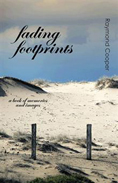
 |
that feeds us,
and the present
that kills us"
Dreams are, to most, right within our grasp; if we simply reach a little more, they will become reality. Raymond Cooper’s fading footprints presents a group of well-written and aesthetically pleasing poems that glorify the memory of how things used to be and profess a desire to recreate them. Within, the speaker understands that the experience will never exactly be the same as it was in that moment in time. From dreams to love and the passing of time, Cooper's poems, often assigned a number as the title, touch on many introspective themes.
In "3," material wealth is pushed aside for a memorable county fair experience as the best method for winning a lady's company. The image of towering three-story homes feels lifeless and empty, while that of dolls and elephants, despite being simple, is far more vibrant. "July Man," deliberates on the importance of the speaker's birth month and perhaps how that helped him find love. The poem, like most others, is short and free of fluff. The arrangement of the syntax helps the main idea of each poem stand out. Additionally, the illustration of a long, winding road through the foggy woods triggers memories of Robert Frost's "The Road not Taken."
Must-read poems that dive into a range of emotions include, "Son," "A Passing Flower," "Waiting Game," and particularly "13," which tells the story of waiting and passing of time with a compelling phrase: "The lines on my face you will have to ignore, for those I can do little about." fading footprints is a genuine expression of emotion from Cooper and a treat for fans who enjoyed personal revelations.